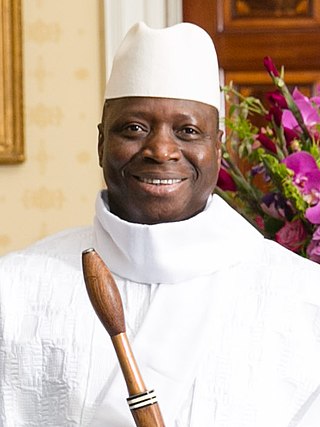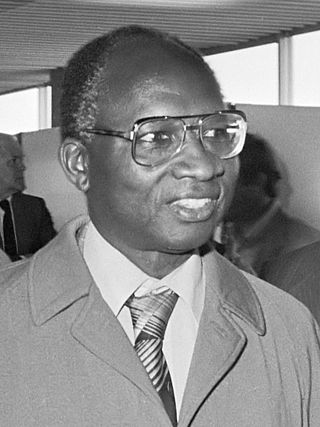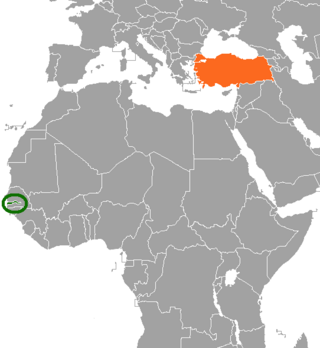
The Gambia, officially the Republic of The Gambia, is a country in West Africa. Geographically, The Gambia is the smallest country in continental Africa; it is surrounded by Senegal on all sides except for the western part, which is bordered by the Atlantic Ocean.

Politics of The Gambia takes place within the framework of a presidential republic, whereby the President of The Gambia is both head of state and head of government, and of a multi-party system. Executive power is exercised by the government. Legislative power is vested in both the government and parliaments.

The first written records of the region come from Arab traders in the 9th and 10th centuries. In medieval times, the region was dominated by the Trans-Saharan trade and was ruled by the Mali Empire. In the 16th century, the region came to be ruled by the Songhai Empire. The first Europeans to visit the Gambia River were the Portuguese in the 15th century, in 1447, who attempted to settle on the river banks, but no settlement of significant size was established. Descendants of the Portuguese settlers remained until the 18th century. In the late 16th century, English merchants attempted to begin a trade with the Gambia, reporting that it was "a river of secret trade and riches concealed by the Portuguese."

Yahya Abdul-Aziz Jemus Junkung Jammeh is a Gambian politician and military dictator who overthrew the elected government and became President of the Gambia from 1996 to 2017, as well as Chairman of the Armed Forces Provisional Ruling Council (AFPRC) from 1994 to 1996.

Sir Dawda Kairaba Jawara was a Gambian politician who served as prime minister from 1962 to 1970, and then as the first President of The Gambia from 1970 to 1994, when he was deposed.

Serekunda is a city and the largest urban centre in The Gambia. It is situated close to the Atlantic coast, on the Gambia River, near the capital, Banjul. Serekunda and Banjul form an urban area known as the Kombos, with about half of the population of the Gambia.

The People's Progressive Party is a political party in the Gambia. It was the dominant ruling party of the House of Representatives and the presidency from 1962 to 1994. The president throughout this time period was Dawda Jawara.

The National Assembly of the Gambia is the unicameral legislature of the Gambia. The authorisation for the National Assembly lies in Chapter VII of the Constitution of the Gambia. It is composed of 53 members directly elected through first past the post, and a further five members appointed by the President.
Sheriff Mustapha Dibba was a Gambian politician who was the 1st Vice-President of the Gambia (1970–1972) and also served as the country's National Assembly speaker from 2002 to 2006. He was also leader of the National Convention Party (NCP).

Islam is the major religion in the Gambia, representing 97% of the 2 million population, with the first Muslim communities in the country arriving in 11th century. Islam has therefore had an influence on the Gambia throughout history, and continues to impact its culture, society and politics. The majority of The Gambia's Muslims are Sunni belonging to the Maliki school of jurisprudence, influenced with Sufism. There is a smaller Shiite community, largely stemming from Lebanese and Arab migration. The Ahmadiyya movement is also present. Other religious societies exist in the country, including Catholics, Protestants, Hindus and Traditional African religions.

Pierre Sarr N'Jie was a Gambian lawyer and politician who served as the Chief Minister of the Gambia from 1961 to 1962. He was the country's first head of government following the declaration of self-rule in 1961. From 1952 until 1977, he was leader of the United Party. He was also a member of the House of Representatives from 1960 to 1972, and de facto Leader of the Opposition for a period, opposite Dawda Jawara.

The Gambia is divided into five administrative Regions and one City. The divisions of the Gambia are created by the Independent Electoral Commission in accordance to Article 192 of the National Constitution.

The Democratic Congress Alliance (DCA) was a political alliance in the Gambia. It was formed in the run-up to the 1960 general elections by the Democratic Party and the Muslim Congress Party.

Parliamentary elections were held in the Gambia on 29 March 2012. The ruling Alliance for Patriotic Reorientation and Construction (APRC) won 43 of the 48 elected seats.

The Gambia Colony and Protectorate was the British colonial administration of The Gambia from 1821 to 1965, part of the British Empire in the New Imperialism era. The colony was the immediate area surrounding Bathurst, and the protectorate was the inland territory situated around the Gambia River, which was declared in 1894.

Presidential elections were held in The Gambia on 1 December 2016. In a surprise result, opposition candidate Adama Barrow defeated long-term incumbent Yahya Jammeh. The election marked the first change of presidency in The Gambia since a military coup in 1994, and the first transfer of power by popular election since independence from the United Kingdom in 1965.

A constitutional crisis occurred in Gambia following presidential elections in December 2016, in which challenger Adama Barrow achieved an upset victory over longtime incumbent Yahya Jammeh. It eventually concluded after a military intervention by the Economic Community of West African States (ECOWAS) led to Jammeh's departure from the country.
Trade unions in The Gambia are regulated under the Labour Act 2007. The first trade union was the Bathurst Trade Union (BTU), founded in 1929, which led a general strike that year. General strikes were also led by the Gambia Workers' Union (GWU) in 1960, 1961, 1967, and 1970, although not all were successful. There are three trade union centres in The Gambia: the Gambia Trade Union Bureau (GamTUB), the Gambian Workers' Confederation (GWC), and the Gambia National Trade Union Congress (GNTUC). The country joined the International Labour Organization (ILO) in 1995.

The Gambia–Turkey relations are the foreign relations between The Gambia and Turkey.
The First Lady of the Gambia is the official title of the wife of the President or Head of State of The Gambia. Since January 19, 2017, Fatoumatta Bah-Barrow has been First Lady.












